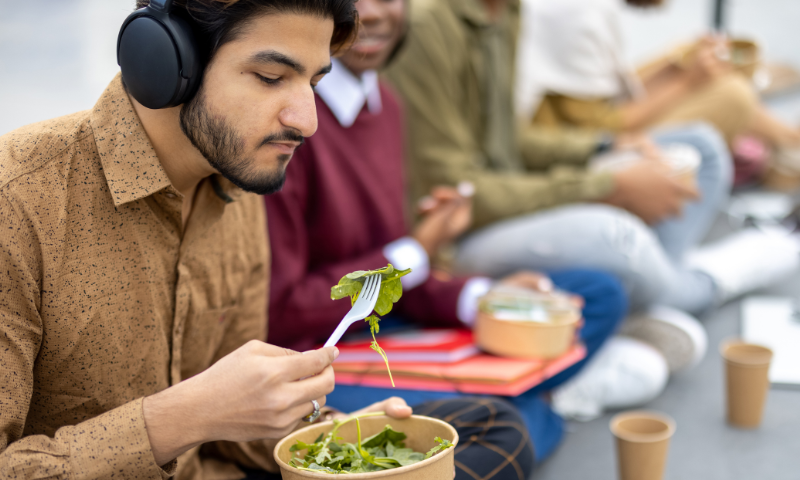Healthy eating in college may seem impossible with the amount of freedom and food options that students have. College kids are busy, sleep deprived, and often take little time to manage their health or nutrition.
However, nutrition cannot be ignored over these early adult years. The transition from living at home to being on your own is a big one. Without a home kitchen and family meals, nutrition habits change quickly. The good news is that finding balance in these early years can transpire to building healthy habits for a lifetime.
Quick and Easy Eats
Class times and schedules vary, and it may be difficult to fit in three balanced meals per day. Without a plan, it’s easy to turn to a bag of chips and soda for lunch. Stock up on grab-and-go nutritious items that you can store in your dorm room or apartment kitchen.
With little time to cook, make sure you have a variety of easy options available. Choices like string cheese, jerky sticks, hard-boiled eggs, yogurt and protein bars can all make great sources of quality protein. While some choices are great for an early grab-and-go breakfast, others will work well for throwing in your backpack for a snack in-between meals.
Other great snack choices are:
- Whole pieces of fruit
- Popcorn
- Pretzels
- Whole grain crackers
- Baby carrots
Hydration and Alcohol
College kids are expected to have fun, but don’t let excessive alcohol wreck your nutrition plan. Alcohol typically comes with a lot of extra sugar and calories. Drinking more can also lead to eating more. As with all balanced nutrition plans, moderation is key. Limiting your number of nights out or having just a couple drinks per week can have a big impact on your health.
Hydration is also crucial for your health. Iced coffee, soda and juices are fine on occasion, but the majority of fluid you consume should be water. Too many sugary beverages can lead to glucose issues and weight gain. Too much caffeine can also have ill effects, especially on your energy levels as you go throughout your day. Instead, choose mostly water for your diet with a few other beverages sprinkled in.
Take Note of Your Nutrients
What you eat has a significant impact on your health. It’s important to eat a variety of foods to diversify the nutrients you give your body.
For instance, protein is key for maintaining muscle mass and staying full between meals. Choose a protein-based food at each meal such as chicken, fish, beans or low-fat dairy.
Carbohydrates provide your body with energy. Healthy sources of carbohydrates include fresh fruits and vegetables and whole grains. Rather than eating processed carbs, strive for the whole food options.
Fats play an important role in your nutrition. They help absorb fat-soluble vitamins and can improve your cardiovascular health. Aim for monounsaturated and polyunsaturated fats such as fish, nuts, avocadoes, olive oil and canola oil.
Making Healthy Buffet Choices
College meal plans that include buffet-style meals have advantages as well as disadvantages. You can generally always find lean meats, a variety of produce and a salad bar. However, there will also be a variety of sweets, treats and fried foods. When dining at a buffet, moderation is key. It can be very tempting to add extra treats, have seconds and pile on the fried foods. Instead, make a plan ahead of time for dining at a buffet and stick to it.
- Choose lean protein at meals.
- Add a serving of produce at each meal.
- Limit treats to a few times a week.
- Choose fried foods in moderation.
- Use mindful eating to determine if you need seconds.
Overall, healthy eating in college is possible if you strive for balance and focus on taking care of yourself. You will be grateful you need in the years to come!






